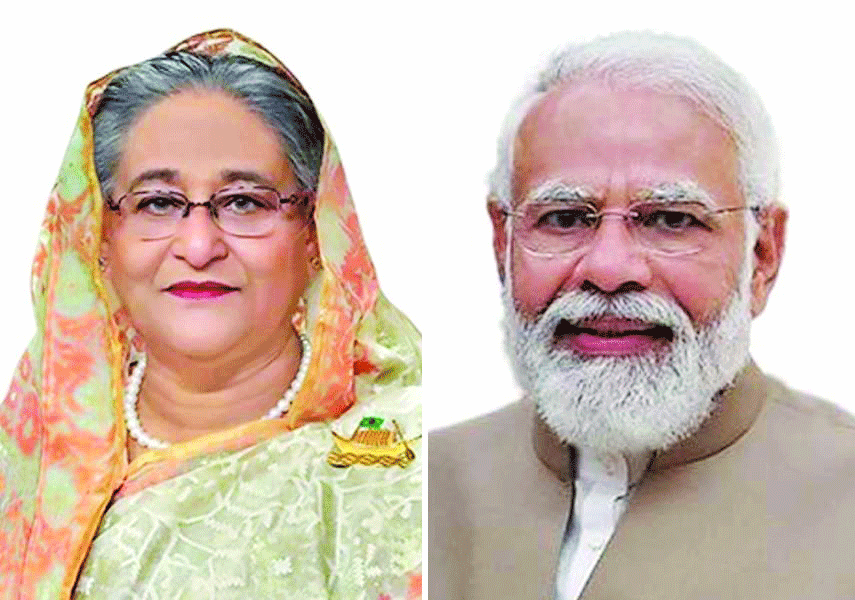India changes its stance on Awami League govt
Asifiqbal Thakoor, Delhi: Before Indian Prime Minister Narendra Modi stepped on the White House red carpet, Indian experts insisted that New Delhi should focus more on protecting its interests in neighboring countries, as opposed to US efforts to promote democracy.
With regard to Bangladesh in particular, they argued that it was in India’s best interest to continue supporting the Awami League government in the context of the US sanctions and the visa policy announced on the occasion of the upcoming elections.
The main objective of Modi’s visit was to highlight cooperation between the US and India on ‘issues of mutual interests’. Many expected that the Bangladesh issue will also be included in the bilateral talks. However, press reports after Modi’s visit to the US were noticeably silent on Bangladesh.
Even the US-India joint statement did not mention Bangladesh issue. This created discontent among the supporters of the ruling Awami League. Because, they expected that Modi will talk to Biden on behalf of Prime Minister Sheikh Hasina.
In such a context, Chinese Foreign Ministry spokesperson Wang Wenbin applauded Sheikh Hasina for speaking the mind of the international community, especially a large part of the developing world, on the US sanctions.
On the other hand, Russia has expressed concern that the way the US and European countries have called for free elections in Bangladesh is an “export of neo-colonialism” and “obvious interference” in Bangladesh’s internal affairs. Iranian state-backed television also echoed accusations from Moscow and Beijing.
Meanwhile, the US pressure on the importance of democracy and free elections in Bangladesh has also been reflected in the European Union. They also linked things like the US with the trade of Bangladesh.
However, Awami League supporters are determined to secure another five years in power despite allegations of widespread human rights abuses. Professor Ali Riaz of Illinois State University said that the future of multi-party democracy in Bangladesh will depend on the credibility of the upcoming elections.
India stood by Sheikh Hasina and her government in the last general elections. But does Modi’s silence during Narendra Modi’s latest visit to Washington indicate that Delhi is slowly changing its stance on the Awami League government?
There are also questions, whether India will spend its own political capital to advocate for the Awami League to the Biden administration.
More broadly, questions remain about the extent to which the US-India partnership will influence developments in the Asia-Pacific region.
Daniel Markey, senior adviser on South Asia at the United States Institute of Peace, said in his recent foreign affairs article that Washington and Delhi share interests but not values.
He added that US officials must understand that India is not their ally. Indian-origin writer Barkha Dutt wrote in the Washington Post that India will not take its advice from the US on China. New Delhi wants to manage the relationship on its own terms. They do not want to see strategic cooperation as a long-term alliance.
Both these articles were published on the eve of Prime Minister Modi’s visit. It indicated that the content of the bilateral talks would not be buried under the pomp of the visit. During the visit, Indian Prime Minister Modi used the word ‘AI’ to describe the relationship between the US and India.
He probably coined the word with ‘A’ from America and ‘I’ from India in association with artificial intelligence. This artificial intelligence and US-India relations have a common aspect. There are still some unknowns in AI and the US-India relationship that have not been defined.
Is Bangladesh now in that unknown part? The US is pushing for democracy and human rights here, and India is still assessing its implications.
Before Modi’s visit, NSC Coordinator John Kirby said, “We have allowed the Indian government to talk about its bilateral relations with Bangladesh.”
But we have already made clear our desire to see free and fair elections in Bangladesh. Speaking at an event at the India International Center in Delhi to celebrate the success of the Modi government, Indian External Affairs Minister Subrahmanyam Jaishankar recently said that India is interfering less and less in the internal political affairs of its neighbours. He made this comment just a week after Prime Minister Modi’s visit to Washington.
Sheikh Hasina’s 15-year rule was unchallenged except for the US ban on Bangladesh’s Rapid Action Battalion and the implementation of a new visa policy. But there are rumors that Washington will no longer follow New Delhi on its policy towards Bangladesh.
Washington’s recent firm stance and silence on Bangladesh during Modi’s visit have reinforced this perception. It is in this context that senior US officials visited Dhaka recently.
On the other hand, the frequent visits of Indian officials to Bangladesh after the 2014 and 2018 elections is now decreasing. As nothing is known whether Bangladesh was discussed in the Modi-Biden meeting, observers will continue to analyze the visit.
Source: US-based South Asia Perspectives (SAP)
Rare Israeli airstrike in Beirut kills Hezbollah commander and more than a dozen others
International Desk: Israel launched a rare airstrike that killed a senior Hezbollah milita…








